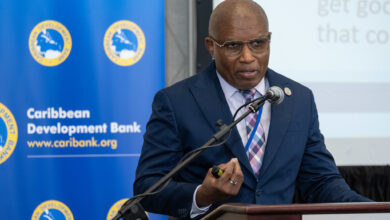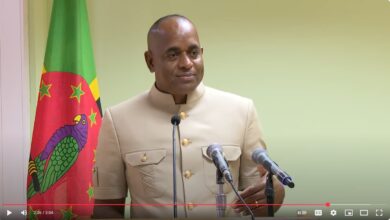(CARICOM Secretariat, Georgetown, Guyana) The birth of a child often evokes a wellspring of hope and joy, as well as a sense of pride. For the Caribbean Community (CARICOM) family, the inauguration of the Caribbean Court of Justice (CCJ) on Saturday 16 April 2005 in Trinidad and Tobago was truly a time of celebration and a moment of Caribbean euphoria for it marked the culmination of a century old period of gestation, and the birth of the Region's final Court of Appeal.
Now that the CCJ is finally here, it is anticipated that it is but a matter of time before the ties with the Judicial Committee of the Privy Council are completely severed. Indeed, most CARICOM Member States are in the course of enacting legislation for the CCJ to be their final Court of Appeal in civil and criminal matters. Already, in its Original Jurisdiction, the CCJ is at present the final arbiter of the interpretation and application of the Revised Treaty of Chaguaramas establishing the Caribbean Community including the CARICOM Single Market and Economy (CSME).
It was way back in the early 20th Century that the idea of replacing the Privy Council first surfaced among Caribbean citizens and learned scholars who recognised the need to establish a judicial system that would better suit the post-abolition era and the citizens of the Caribbean. The Jamaica Gleaner of March 6, 1901, records the call for a new Caribbean judicial system on the premise that the Privy Council was “out of joint with the condition of the times..”
Several decades later in 1945, the notion of a court of last resort and one indigenous to the Region emerged once again, but it was only after another twenty-five years of ineffectual fervour in pursuit of the establishment of the Court, that the then Prime Minister of Jamaica, Edward Seaga, resolved to have the matter tabled at the Heads of Government meeting in Kingston. Two years later, in 1972, the Resolution to establish the Regional Court of Appeal was endorsed by the Organisation of the Commonwealth Caribbean Bar Associations (OCCBA), and subsequently put to Regional Attorneys-General in 1989 for their consideration during a meeting of CARICOM Heads of Government in Trinidad and Tobago.
The 1992 West Indian Commission, in its report titled A Time For Action, articulated that the time was apt for the Region to establish a Court with legal minds and jurists indigenous to the Caribbean. The position of the West Indian Commission swiftly became an imperative with the need to ensure the effective implementation of the CARICOM Single Market and Economy (CSME), agreed by Heads of Government in 2001 as the preferred means to sustain the Regional economies and to collectively operate on the global plane.
Inauguration Fanfare
The 16 April 2005 fanfare to mark the inauguration of the CCJ was staged at Queens Hall in St Ann's, Port of Spain, and in attendance was a multitude of CARICOM friends and family, partners and associates, the Heads of Government, and stewards of the Community.
In his welcome remarks, CARICOM Secretary-General, His Excellency Edwin Carrington said of the birthing of the CCJ, “The road has been long… with many a winding turn..” He noted that the Court's coming into being marked the completion of the Region's independence. “This Court is the Court Of the Caribbean People, By the Caribbean People, For the Caribbean People,” added Mr. Carrington.
He further pointed out that the CCJ is a critical pillar of the CSME, which he viewed as the vehicle for the Region's sustainable development. “The CSME is the most effective means by which the economies of the Region can be successfully integrated into the proposed new hemispheric and global economy, ” stated the Secretary General.
Prime Minister of Trinidad and Tobago, Hon Patrick Manning, said the inauguration marked the Caribbean Community's arrival at a destination that has taken the Region 100 years of travel. Reflecting on the earlier meetings and discussions that preceded the induction of the Court, Prime Minister Manning expressed confidence that it will be another Regional institution creating a source of pride for all Caribbean citizens.
Mr. Manning said, “That we can be present today at the inauguration of this Court is a testimony to the industry of CARICOM, members of the regional judiciary, the Heads of Government and most importantly, the people of this Region who, by their clamour for a greater union, have given the mandate to their representatives to make this morning's proceedings possible.” He added, “The CCJ is our statement that, in yet another area, we are once again prepared to stand as one Region with one voice.”
At the CCJ inauguration, Prime Minister of Saint Lucia and CARICOM Head of Government with responsibility for Justice and Governance, Dr the Hon. Kenny Anthony, magnified the historic role and high standards exemplified by legal luminaries from the Caribbean. He posited that the inauguration of the CCJ resonates as a moment of unique significance.
In alluding to the Region's legal luminaries' attainment to high offices in institutions such as the International Criminal Court (ICC) and the International Court of Justice (ICJ), he added, “We laid the foundations of strong legal professions and legal and judicial institutions many decades ago…” Dr Anthony stated further, “The Caribbean Court of Justice is not a leap into darkness. It is a leap of enlightenment…we are not breaking ranks. We are joining a progressive process in the Commonwealth.”
President of the CCJ, Hon. Mr. Justice Michael de la Bastide cited the inauguration of the Court as a landmark event in the history of the Caribbean. He said the judges feel a deep sense of obligation to serve the people of the Region. The CCJ President observed that the Court bears distinctive characteristics including its independent funding, the process for the selection of judges, and its dual function of being the final municipal court of appeal on criminal and civil matters in its Appellate Jurisdiction, as well as one that is charged with interpreting and applying the Revised Treaty of Chaguaramas, in its Original Jurisdiction. He lauded CARICOM Heads of Government and others who were instrumental in overseeing the gestation of the CCJ, which he noted had been long, and its birth, which he said had not been without complications.
Chairman of the Conference of Heads of Government and President of Suriname, His Excellency Drs. Ronald Runaldo Venetiaan said that the event marks the Region's creation of history in three ways. These he noted are the completion of the journey of independence for English-speaking CARICOM Member States, the creation of a strong legal institution to guarantee the rule of law, and the Caribbean Community's contribution to the processes of economic integration worldwide.
President Venetiaan pledged the support of CARICOM Heads of Government with respect to honoring the independent functioning of the CCJ, and he expressed confidence that the Court will serve the Region well in interpreting the Revised Treaty in both Common Law and Civil Law jurisdictions.
The curtains came down on the grand inauguration of the CCJ, but the spotlight remains on the Court – the quality of the arguments before it; the judgments that it will issue, and the contribution it will make to the jurisprudence of the Region and beyond.





